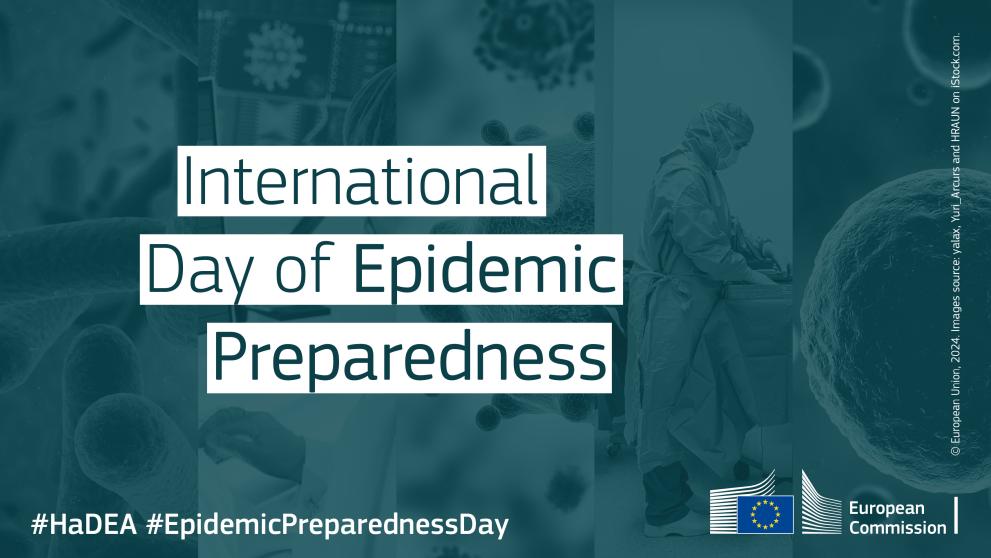
The COVID-19 pandemic, along with more recent examples such as mpox outbreaks in Africa and H5N1 avian influenza in the US, have highlighted the importance of Europe being better prepared for future health threats. HaDEA manages a variety of projects in the field of crisis and pandemic preparedness, under the EU4Health and Horizon Europe programmes as well as under the legacy programme Horizon 2020.
On International Epidemic Preparedness Day, explore some examples of projects aimed at protecting citizens and enhancing Europe’s resilience against cross-border health threats.
EU4Health
The RESIL-Card project aims to improve cardiovascular care during health crises by evaluating how various EU countries and regions respond to pandemics. The project identifies and shares best practices to develop a resilience assessment tool that helps healthcare systems prepare for future crises. This tool will be tested through a vast European network of approximately 40 000 healthcare professionals and medical centres. Additionally, the project creates guidelines, training programmes, and partnerships to reduce the impact of heart disease, particularly during emergencies, in European countries, including Ukraine.
HaDEA also manages contracts in the field of pandemic preparedness. One of these contracts involves testing a new vaccine, MTBVAC*, in newborns to make sure it is safe, effective, and builds immunity. This vaccine would help fight antimicrobial resistance - a serious global problem that makes infections harder to treat with antibiotics.
Another contract has been recently signed to develop a universal test that can quickly detect respiratory and airborne pathogens, including emerging viruses. This diagnostic tool will help speed up public health responses during outbreaks and pandemics.
*MTBVAC is a candidate vaccine against tuberculosis in humans currently in research trials.
Horizon 2020
The MOOD project has developed a big data platform to help human and veterinary public health agencies detect, monitor and track diseases. A key innovation is the MUST tool (Multi-source Surveillance Tool), which combines and analyses different types of data - like epidemiological, genetic, environmental, and socio-economic information - in real time to better understand and respond to health emergencies.
The VEO project focuses on developing tools to improve preparedness for new outbreaks, epidemics, and pandemics by combining knowledge about diseases, pathogens, and factors that drive their spread. Key achievements include the contribution to the COVID-19 Pathogens Portal for global SARS-CoV-2 data, mapping the spread of West Nile virus in Europe using genetic and environmental data, tracking viruses and antibiotic resistance in cities through wastewater analysis, and exploring how AI can predict the traits of new pathogens from their genetic sequences, using avian influenza and SARS-CoV-2 as examples. In 2025, VEO will run a Disease X exercise to test which tools can be generalised and identify next steps for improving future pandemic responses. VEO works on five emergence scenarios: zoonotic wildlife-borne disease, silent epidemic (antimicrobial resistance), vector-borne disease, disease related to (arctic) climate change, and disease X to test which tools can be generalised and identify next steps for improving future pandemic responses.
TT4CL has developed a new oral medication for Old World Cutaneous Leishmaniasis, a neglected tropical disease. This project has improved the testing and formulation of the drug oleylphosphocholine, including its initial safety trials in humans.
Background
EU4Health is the fourth and largest of the EU health programmes. The programme provides funding to national authorities, health organisations and other bodies through grants and public procurement, contributing to a healthier Europe.
HaDEA manages the vast majority of the total EU4Health budget and implements the programme by managing calls for proposals and tenders from 2021 to 2027.
Horizon Europe is the research and innovation programme of the EU for the period 2021-2027. The aims of Cluster 1 ‘Health’ include improving and protecting the health and well-being of citizens of all ages by generating new knowledge, developing innovative solutions and integrating where relevant a gender perspective to prevent, diagnose, monitor, treat and cure diseases. Horizon 2020 (H2020) was the EU’s multiannual funding programme between 2014 and 2020.
Details
- Publication date
- 27 December 2024
- Author
- European Health and Digital Executive Agency
- Programme Sector
- Health
- Programme
- EU4Health
- Horizon Europe Cluster 1: Health
- Tags
- COVID-19
- Health preparedness
